Economic Crisis in Turkey: Causes, Effects, and Policy Responses
VerifiedAdded on 2022/08/25
|9
|1613
|25
Report
AI Summary
This report provides a comprehensive analysis of the economic crisis faced by Turkey. It delves into the causes of the crisis, including political dimensions and loose monetary policies, and examines the effects on both the Turkish and global economies. The report highlights the devaluation of the Turkish lira, rising inflation, and the impact on debt repayment. It also discusses the fiscal and monetary policies implemented by the Turkish government, such as raising interest rates, and explores the challenges the country faces. Furthermore, the report considers the global implications of the crisis, including the potential for market overreaction and the impact on emerging markets. The conclusion summarizes the key findings, emphasizing the political and economic complexities of the situation and its broader consequences.
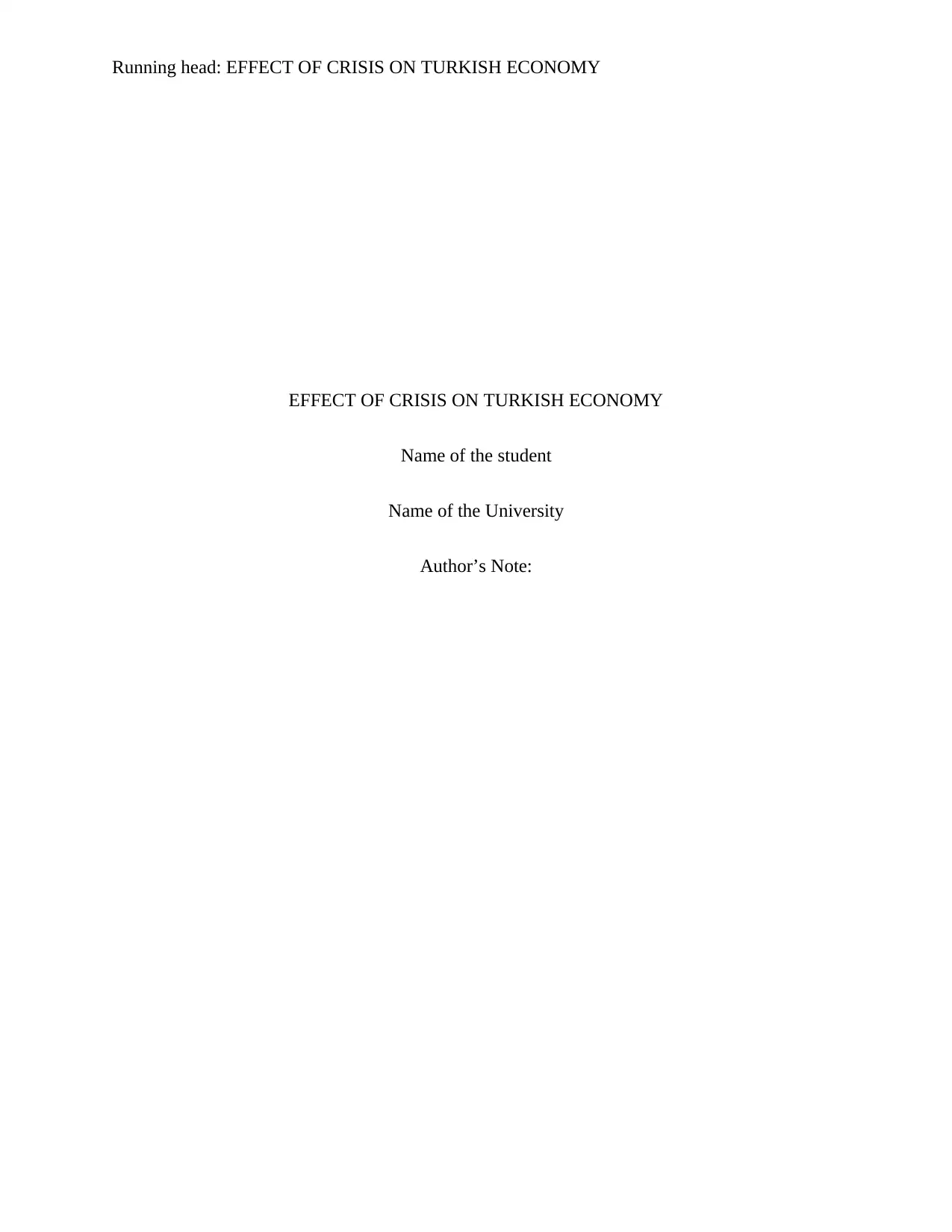
Running head: EFFECT OF CRISIS ON TURKISH ECONOMY
EFFECT OF CRISIS ON TURKISH ECONOMY
Name of the student
Name of the University
Author’s Note:
EFFECT OF CRISIS ON TURKISH ECONOMY
Name of the student
Name of the University
Author’s Note:
Paraphrase This Document
Need a fresh take? Get an instant paraphrase of this document with our AI Paraphraser
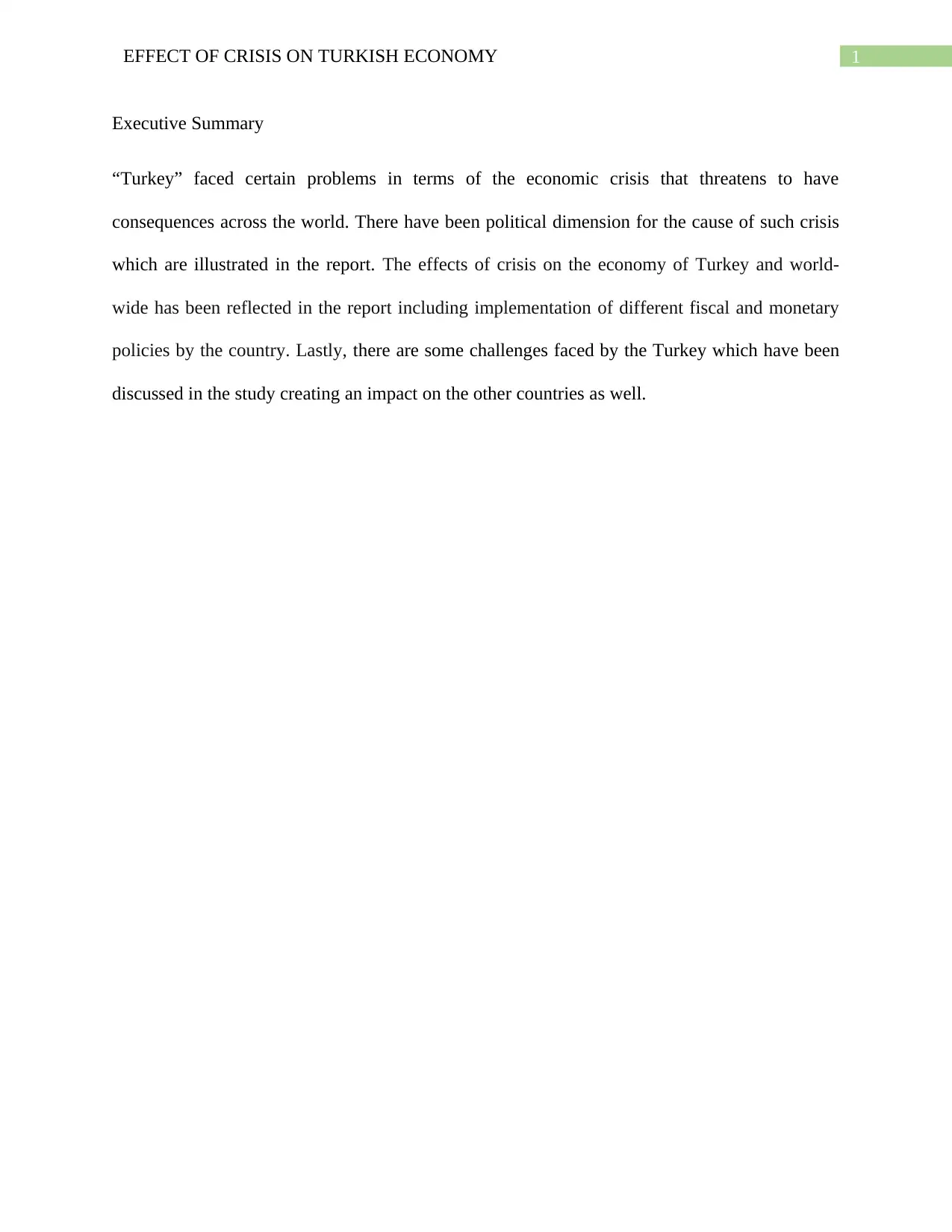
1EFFECT OF CRISIS ON TURKISH ECONOMY
Executive Summary
“Turkey” faced certain problems in terms of the economic crisis that threatens to have
consequences across the world. There have been political dimension for the cause of such crisis
which are illustrated in the report. The effects of crisis on the economy of Turkey and world-
wide has been reflected in the report including implementation of different fiscal and monetary
policies by the country. Lastly, there are some challenges faced by the Turkey which have been
discussed in the study creating an impact on the other countries as well.
Executive Summary
“Turkey” faced certain problems in terms of the economic crisis that threatens to have
consequences across the world. There have been political dimension for the cause of such crisis
which are illustrated in the report. The effects of crisis on the economy of Turkey and world-
wide has been reflected in the report including implementation of different fiscal and monetary
policies by the country. Lastly, there are some challenges faced by the Turkey which have been
discussed in the study creating an impact on the other countries as well.
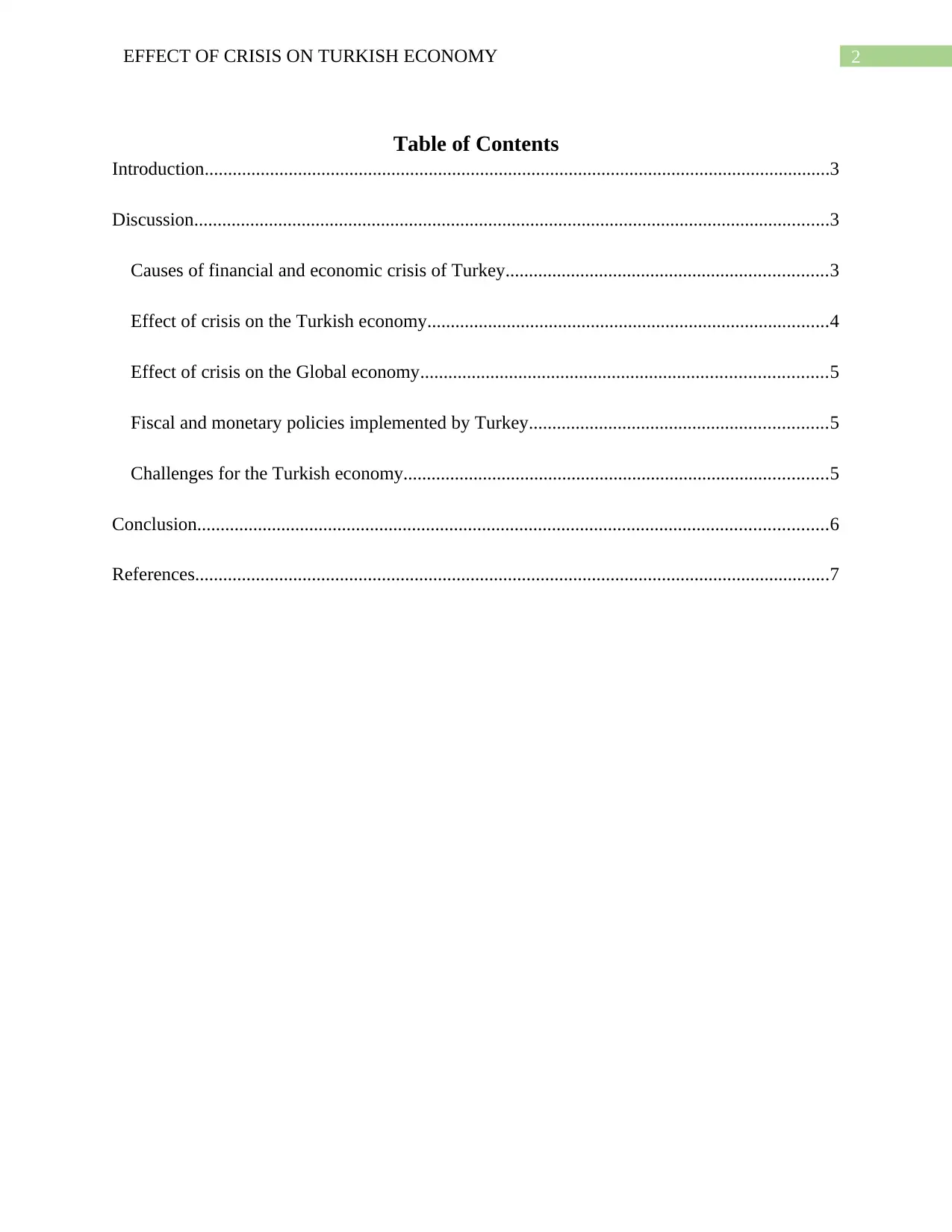
2EFFECT OF CRISIS ON TURKISH ECONOMY
Table of Contents
Introduction......................................................................................................................................3
Discussion........................................................................................................................................3
Causes of financial and economic crisis of Turkey.....................................................................3
Effect of crisis on the Turkish economy......................................................................................4
Effect of crisis on the Global economy.......................................................................................5
Fiscal and monetary policies implemented by Turkey................................................................5
Challenges for the Turkish economy...........................................................................................5
Conclusion.......................................................................................................................................6
References........................................................................................................................................7
Table of Contents
Introduction......................................................................................................................................3
Discussion........................................................................................................................................3
Causes of financial and economic crisis of Turkey.....................................................................3
Effect of crisis on the Turkish economy......................................................................................4
Effect of crisis on the Global economy.......................................................................................5
Fiscal and monetary policies implemented by Turkey................................................................5
Challenges for the Turkish economy...........................................................................................5
Conclusion.......................................................................................................................................6
References........................................................................................................................................7
⊘ This is a preview!⊘
Do you want full access?
Subscribe today to unlock all pages.

Trusted by 1+ million students worldwide
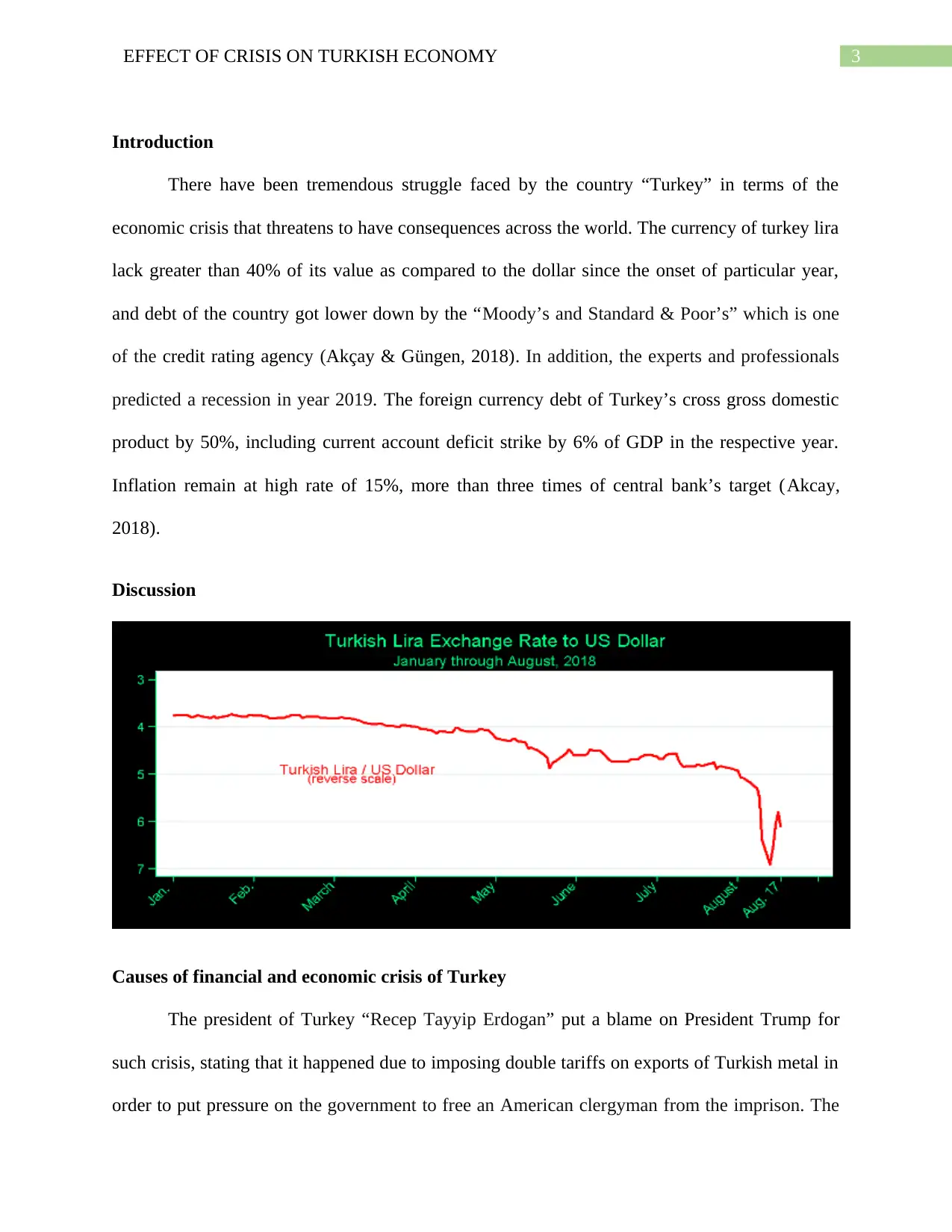
3EFFECT OF CRISIS ON TURKISH ECONOMY
Introduction
There have been tremendous struggle faced by the country “Turkey” in terms of the
economic crisis that threatens to have consequences across the world. The currency of turkey lira
lack greater than 40% of its value as compared to the dollar since the onset of particular year,
and debt of the country got lower down by the “Moody’s and Standard & Poor’s” which is one
of the credit rating agency (Akçay & Güngen, 2018). In addition, the experts and professionals
predicted a recession in year 2019. The foreign currency debt of Turkey’s cross gross domestic
product by 50%, including current account deficit strike by 6% of GDP in the respective year.
Inflation remain at high rate of 15%, more than three times of central bank’s target (Akcay,
2018).
Discussion
Causes of financial and economic crisis of Turkey
The president of Turkey “Recep Tayyip Erdogan” put a blame on President Trump for
such crisis, stating that it happened due to imposing double tariffs on exports of Turkish metal in
order to put pressure on the government to free an American clergyman from the imprison. The
Introduction
There have been tremendous struggle faced by the country “Turkey” in terms of the
economic crisis that threatens to have consequences across the world. The currency of turkey lira
lack greater than 40% of its value as compared to the dollar since the onset of particular year,
and debt of the country got lower down by the “Moody’s and Standard & Poor’s” which is one
of the credit rating agency (Akçay & Güngen, 2018). In addition, the experts and professionals
predicted a recession in year 2019. The foreign currency debt of Turkey’s cross gross domestic
product by 50%, including current account deficit strike by 6% of GDP in the respective year.
Inflation remain at high rate of 15%, more than three times of central bank’s target (Akcay,
2018).
Discussion
Causes of financial and economic crisis of Turkey
The president of Turkey “Recep Tayyip Erdogan” put a blame on President Trump for
such crisis, stating that it happened due to imposing double tariffs on exports of Turkish metal in
order to put pressure on the government to free an American clergyman from the imprison. The
Paraphrase This Document
Need a fresh take? Get an instant paraphrase of this document with our AI Paraphraser
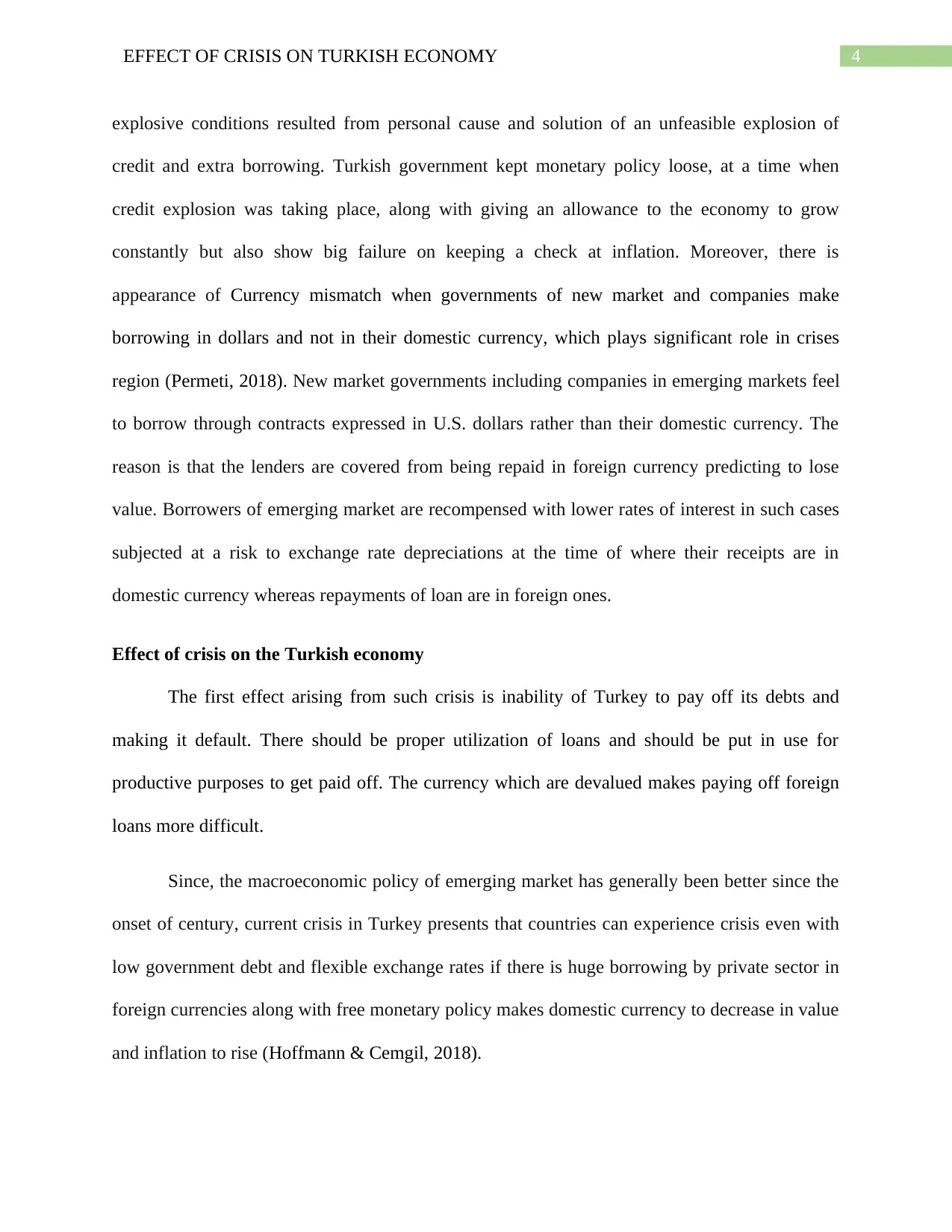
4EFFECT OF CRISIS ON TURKISH ECONOMY
explosive conditions resulted from personal cause and solution of an unfeasible explosion of
credit and extra borrowing. Turkish government kept monetary policy loose, at a time when
credit explosion was taking place, along with giving an allowance to the economy to grow
constantly but also show big failure on keeping a check at inflation. Moreover, there is
appearance of Currency mismatch when governments of new market and companies make
borrowing in dollars and not in their domestic currency, which plays significant role in crises
region (Permeti, 2018). New market governments including companies in emerging markets feel
to borrow through contracts expressed in U.S. dollars rather than their domestic currency. The
reason is that the lenders are covered from being repaid in foreign currency predicting to lose
value. Borrowers of emerging market are recompensed with lower rates of interest in such cases
subjected at a risk to exchange rate depreciations at the time of where their receipts are in
domestic currency whereas repayments of loan are in foreign ones.
Effect of crisis on the Turkish economy
The first effect arising from such crisis is inability of Turkey to pay off its debts and
making it default. There should be proper utilization of loans and should be put in use for
productive purposes to get paid off. The currency which are devalued makes paying off foreign
loans more difficult.
Since, the macroeconomic policy of emerging market has generally been better since the
onset of century, current crisis in Turkey presents that countries can experience crisis even with
low government debt and flexible exchange rates if there is huge borrowing by private sector in
foreign currencies along with free monetary policy makes domestic currency to decrease in value
and inflation to rise (Hoffmann & Cemgil, 2018).
explosive conditions resulted from personal cause and solution of an unfeasible explosion of
credit and extra borrowing. Turkish government kept monetary policy loose, at a time when
credit explosion was taking place, along with giving an allowance to the economy to grow
constantly but also show big failure on keeping a check at inflation. Moreover, there is
appearance of Currency mismatch when governments of new market and companies make
borrowing in dollars and not in their domestic currency, which plays significant role in crises
region (Permeti, 2018). New market governments including companies in emerging markets feel
to borrow through contracts expressed in U.S. dollars rather than their domestic currency. The
reason is that the lenders are covered from being repaid in foreign currency predicting to lose
value. Borrowers of emerging market are recompensed with lower rates of interest in such cases
subjected at a risk to exchange rate depreciations at the time of where their receipts are in
domestic currency whereas repayments of loan are in foreign ones.
Effect of crisis on the Turkish economy
The first effect arising from such crisis is inability of Turkey to pay off its debts and
making it default. There should be proper utilization of loans and should be put in use for
productive purposes to get paid off. The currency which are devalued makes paying off foreign
loans more difficult.
Since, the macroeconomic policy of emerging market has generally been better since the
onset of century, current crisis in Turkey presents that countries can experience crisis even with
low government debt and flexible exchange rates if there is huge borrowing by private sector in
foreign currencies along with free monetary policy makes domestic currency to decrease in value
and inflation to rise (Hoffmann & Cemgil, 2018).
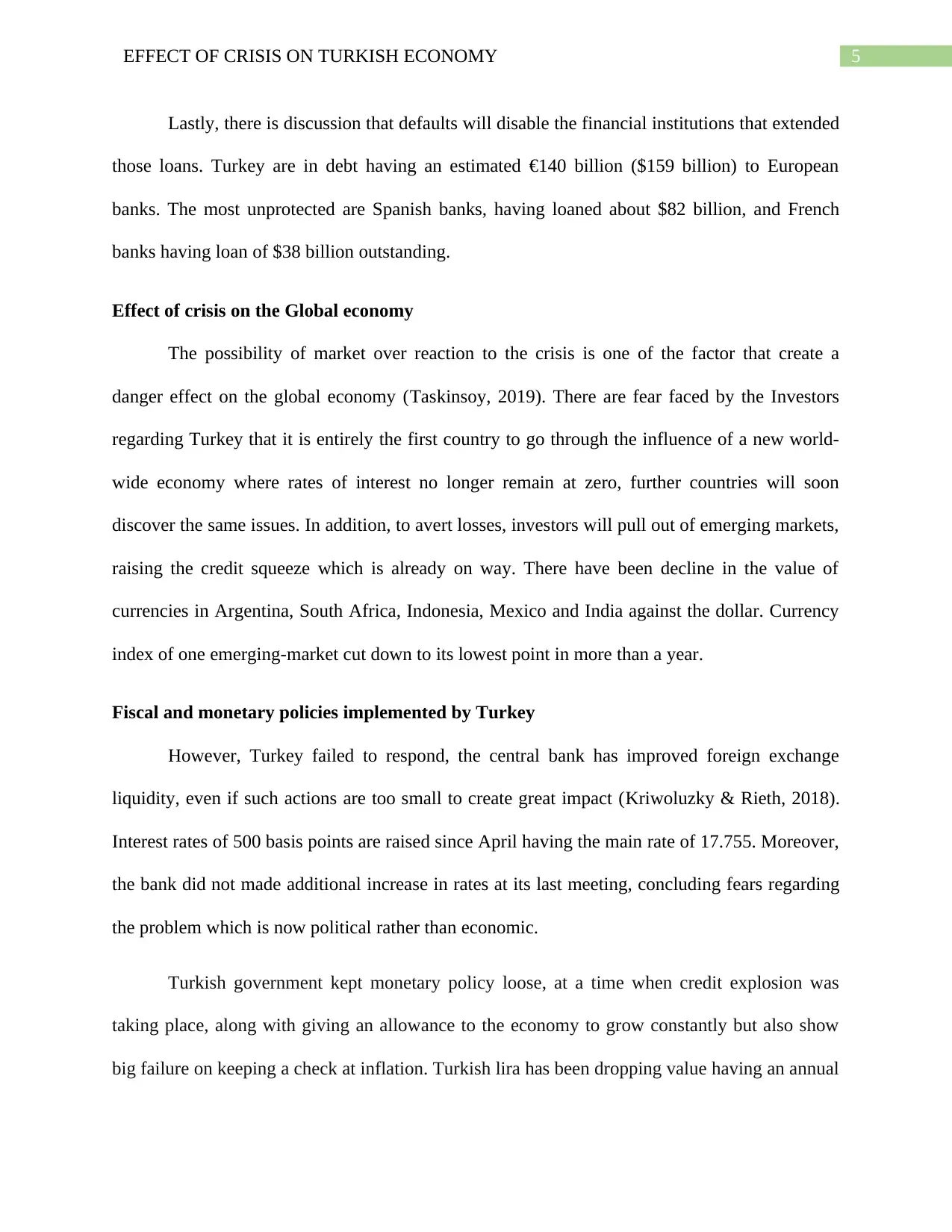
5EFFECT OF CRISIS ON TURKISH ECONOMY
Lastly, there is discussion that defaults will disable the financial institutions that extended
those loans. Turkey are in debt having an estimated €140 billion ($159 billion) to European
banks. The most unprotected are Spanish banks, having loaned about $82 billion, and French
banks having loan of $38 billion outstanding.
Effect of crisis on the Global economy
The possibility of market over reaction to the crisis is one of the factor that create a
danger effect on the global economy (Taskinsoy, 2019). There are fear faced by the Investors
regarding Turkey that it is entirely the first country to go through the influence of a new world-
wide economy where rates of interest no longer remain at zero, further countries will soon
discover the same issues. In addition, to avert losses, investors will pull out of emerging markets,
raising the credit squeeze which is already on way. There have been decline in the value of
currencies in Argentina, South Africa, Indonesia, Mexico and India against the dollar. Currency
index of one emerging-market cut down to its lowest point in more than a year.
Fiscal and monetary policies implemented by Turkey
However, Turkey failed to respond, the central bank has improved foreign exchange
liquidity, even if such actions are too small to create great impact (Kriwoluzky & Rieth, 2018).
Interest rates of 500 basis points are raised since April having the main rate of 17.755. Moreover,
the bank did not made additional increase in rates at its last meeting, concluding fears regarding
the problem which is now political rather than economic.
Turkish government kept monetary policy loose, at a time when credit explosion was
taking place, along with giving an allowance to the economy to grow constantly but also show
big failure on keeping a check at inflation. Turkish lira has been dropping value having an annual
Lastly, there is discussion that defaults will disable the financial institutions that extended
those loans. Turkey are in debt having an estimated €140 billion ($159 billion) to European
banks. The most unprotected are Spanish banks, having loaned about $82 billion, and French
banks having loan of $38 billion outstanding.
Effect of crisis on the Global economy
The possibility of market over reaction to the crisis is one of the factor that create a
danger effect on the global economy (Taskinsoy, 2019). There are fear faced by the Investors
regarding Turkey that it is entirely the first country to go through the influence of a new world-
wide economy where rates of interest no longer remain at zero, further countries will soon
discover the same issues. In addition, to avert losses, investors will pull out of emerging markets,
raising the credit squeeze which is already on way. There have been decline in the value of
currencies in Argentina, South Africa, Indonesia, Mexico and India against the dollar. Currency
index of one emerging-market cut down to its lowest point in more than a year.
Fiscal and monetary policies implemented by Turkey
However, Turkey failed to respond, the central bank has improved foreign exchange
liquidity, even if such actions are too small to create great impact (Kriwoluzky & Rieth, 2018).
Interest rates of 500 basis points are raised since April having the main rate of 17.755. Moreover,
the bank did not made additional increase in rates at its last meeting, concluding fears regarding
the problem which is now political rather than economic.
Turkish government kept monetary policy loose, at a time when credit explosion was
taking place, along with giving an allowance to the economy to grow constantly but also show
big failure on keeping a check at inflation. Turkish lira has been dropping value having an annual
⊘ This is a preview!⊘
Do you want full access?
Subscribe today to unlock all pages.

Trusted by 1+ million students worldwide
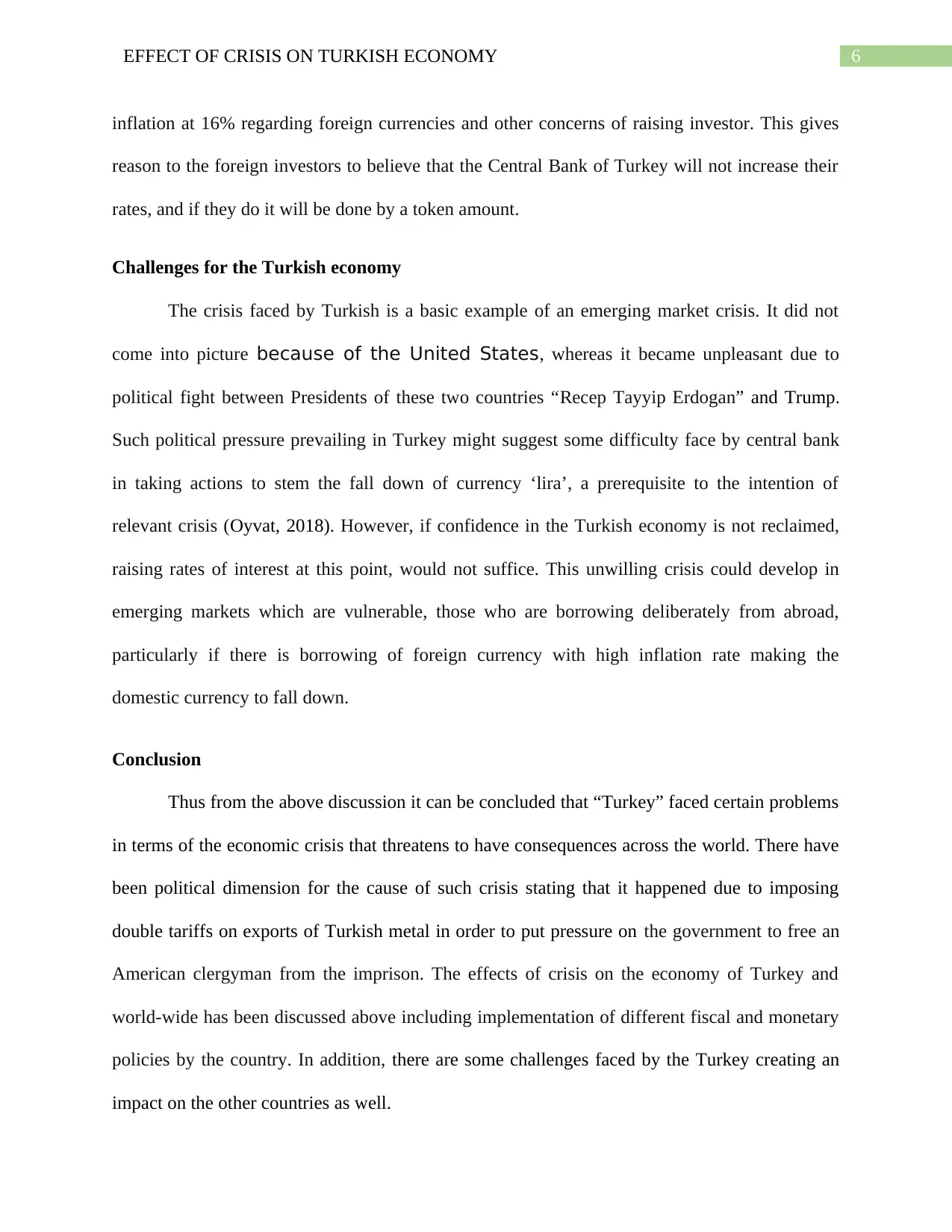
6EFFECT OF CRISIS ON TURKISH ECONOMY
inflation at 16% regarding foreign currencies and other concerns of raising investor. This gives
reason to the foreign investors to believe that the Central Bank of Turkey will not increase their
rates, and if they do it will be done by a token amount.
Challenges for the Turkish economy
The crisis faced by Turkish is a basic example of an emerging market crisis. It did not
come into picture because of the United States, whereas it became unpleasant due to
political fight between Presidents of these two countries “Recep Tayyip Erdogan” and Trump.
Such political pressure prevailing in Turkey might suggest some difficulty face by central bank
in taking actions to stem the fall down of currency ‘lira’, a prerequisite to the intention of
relevant crisis (Oyvat, 2018). However, if confidence in the Turkish economy is not reclaimed,
raising rates of interest at this point, would not suffice. This unwilling crisis could develop in
emerging markets which are vulnerable, those who are borrowing deliberately from abroad,
particularly if there is borrowing of foreign currency with high inflation rate making the
domestic currency to fall down.
Conclusion
Thus from the above discussion it can be concluded that “Turkey” faced certain problems
in terms of the economic crisis that threatens to have consequences across the world. There have
been political dimension for the cause of such crisis stating that it happened due to imposing
double tariffs on exports of Turkish metal in order to put pressure on the government to free an
American clergyman from the imprison. The effects of crisis on the economy of Turkey and
world-wide has been discussed above including implementation of different fiscal and monetary
policies by the country. In addition, there are some challenges faced by the Turkey creating an
impact on the other countries as well.
inflation at 16% regarding foreign currencies and other concerns of raising investor. This gives
reason to the foreign investors to believe that the Central Bank of Turkey will not increase their
rates, and if they do it will be done by a token amount.
Challenges for the Turkish economy
The crisis faced by Turkish is a basic example of an emerging market crisis. It did not
come into picture because of the United States, whereas it became unpleasant due to
political fight between Presidents of these two countries “Recep Tayyip Erdogan” and Trump.
Such political pressure prevailing in Turkey might suggest some difficulty face by central bank
in taking actions to stem the fall down of currency ‘lira’, a prerequisite to the intention of
relevant crisis (Oyvat, 2018). However, if confidence in the Turkish economy is not reclaimed,
raising rates of interest at this point, would not suffice. This unwilling crisis could develop in
emerging markets which are vulnerable, those who are borrowing deliberately from abroad,
particularly if there is borrowing of foreign currency with high inflation rate making the
domestic currency to fall down.
Conclusion
Thus from the above discussion it can be concluded that “Turkey” faced certain problems
in terms of the economic crisis that threatens to have consequences across the world. There have
been political dimension for the cause of such crisis stating that it happened due to imposing
double tariffs on exports of Turkish metal in order to put pressure on the government to free an
American clergyman from the imprison. The effects of crisis on the economy of Turkey and
world-wide has been discussed above including implementation of different fiscal and monetary
policies by the country. In addition, there are some challenges faced by the Turkey creating an
impact on the other countries as well.
Paraphrase This Document
Need a fresh take? Get an instant paraphrase of this document with our AI Paraphraser
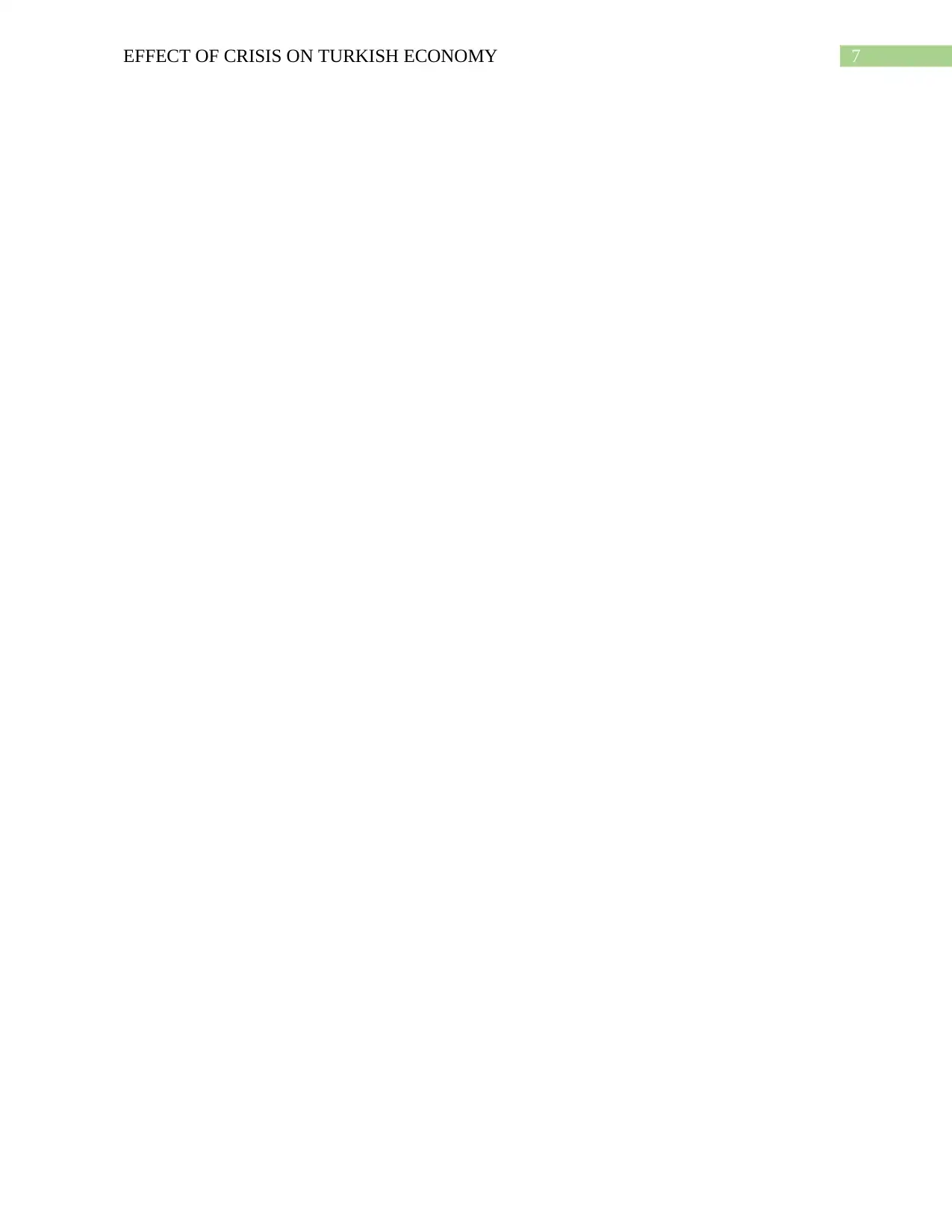
7EFFECT OF CRISIS ON TURKISH ECONOMY
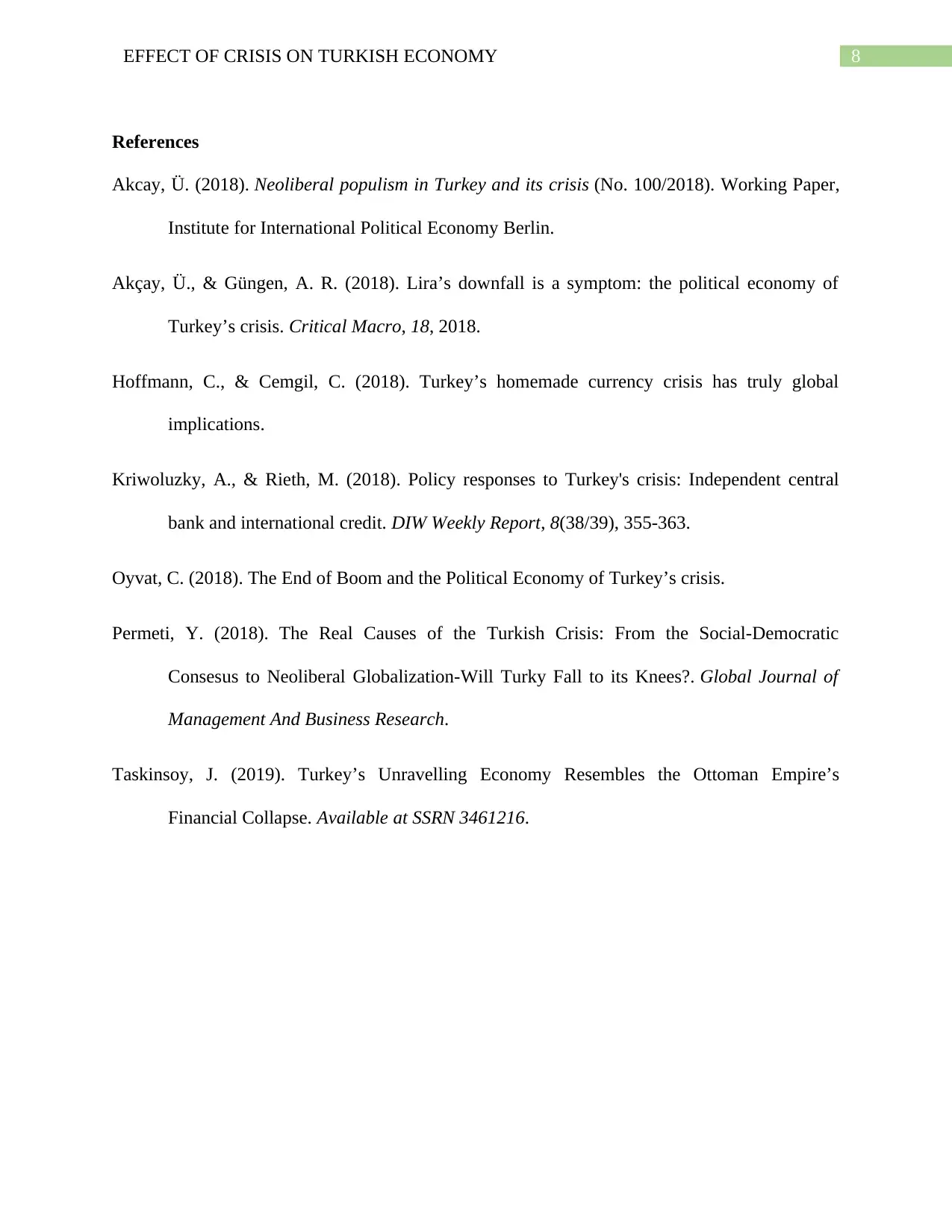
8EFFECT OF CRISIS ON TURKISH ECONOMY
References
Akcay, Ü. (2018). Neoliberal populism in Turkey and its crisis (No. 100/2018). Working Paper,
Institute for International Political Economy Berlin.
Akçay, Ü., & Güngen, A. R. (2018). Lira’s downfall is a symptom: the political economy of
Turkey’s crisis. Critical Macro, 18, 2018.
Hoffmann, C., & Cemgil, C. (2018). Turkey’s homemade currency crisis has truly global
implications.
Kriwoluzky, A., & Rieth, M. (2018). Policy responses to Turkey's crisis: Independent central
bank and international credit. DIW Weekly Report, 8(38/39), 355-363.
Oyvat, C. (2018). The End of Boom and the Political Economy of Turkey’s crisis.
Permeti, Y. (2018). The Real Causes of the Turkish Crisis: From the Social-Democratic
Consesus to Neoliberal Globalization-Will Turky Fall to its Knees?. Global Journal of
Management And Business Research.
Taskinsoy, J. (2019). Turkey’s Unravelling Economy Resembles the Ottoman Empire’s
Financial Collapse. Available at SSRN 3461216.
References
Akcay, Ü. (2018). Neoliberal populism in Turkey and its crisis (No. 100/2018). Working Paper,
Institute for International Political Economy Berlin.
Akçay, Ü., & Güngen, A. R. (2018). Lira’s downfall is a symptom: the political economy of
Turkey’s crisis. Critical Macro, 18, 2018.
Hoffmann, C., & Cemgil, C. (2018). Turkey’s homemade currency crisis has truly global
implications.
Kriwoluzky, A., & Rieth, M. (2018). Policy responses to Turkey's crisis: Independent central
bank and international credit. DIW Weekly Report, 8(38/39), 355-363.
Oyvat, C. (2018). The End of Boom and the Political Economy of Turkey’s crisis.
Permeti, Y. (2018). The Real Causes of the Turkish Crisis: From the Social-Democratic
Consesus to Neoliberal Globalization-Will Turky Fall to its Knees?. Global Journal of
Management And Business Research.
Taskinsoy, J. (2019). Turkey’s Unravelling Economy Resembles the Ottoman Empire’s
Financial Collapse. Available at SSRN 3461216.
⊘ This is a preview!⊘
Do you want full access?
Subscribe today to unlock all pages.

Trusted by 1+ million students worldwide
1 out of 9
Related Documents
Your All-in-One AI-Powered Toolkit for Academic Success.
+13062052269
info@desklib.com
Available 24*7 on WhatsApp / Email
![[object Object]](/_next/static/media/star-bottom.7253800d.svg)
Unlock your academic potential
Copyright © 2020–2026 A2Z Services. All Rights Reserved. Developed and managed by ZUCOL.





